Biting is a natural behavior for birds, but it can be a problem for pet bird owners. Understanding why your bird bites and how to address the behavior is important for maintaining a healthy and happy relationship with your feathered friend.
It can be caused by a variety of factors such as boredom, hormonal changes, or over-stimulation. Similarly, birds that are going through hormonal changes may also exhibit biting behavior.
In this case, it’s important to understand that biting is not a sign of aggression or malice on the part of the bird, but rather a symptom of an underlying issue.
However, it is possible to discipline a bird when it bites its owner. And we have designed this blog to discuss this fact well. Make sure to check all the details properly.
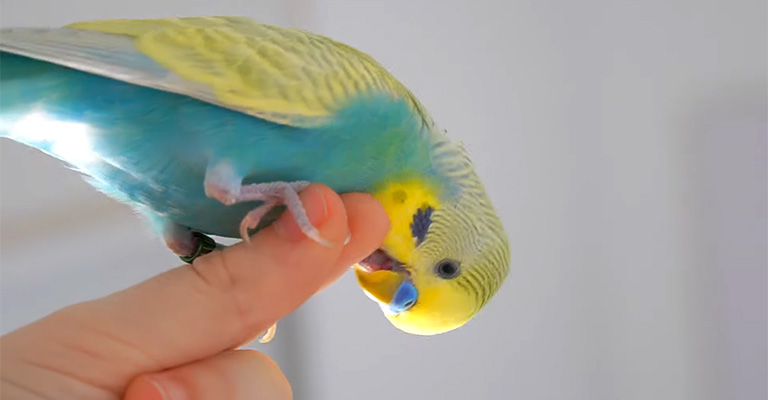
Why Do Bird Bites?
Birds may bite for a variety of reasons, including territorial behavior, fear, over-stimulation, boredom, or hormonal changes.
Territorial Behavior
A bird may bite when it feels its territory is being invaded. This can include biting when a new person or animal is introduced to the household, or if the bird perceives someone as a threat to its cage or food.
Fear
Birds may bite when they are scared or frightened. This can happen if the bird is not used to being handled or is not socialized properly.
Over-stimulation
As mentioned earlier, birds may bite when they are feeling overwhelmed by too much attention or activity. This can happen if the bird is not given enough time to rest and relax, or if it is being handled too much.
Boredom
Birds that are not provided with enough toys, perches, and activities to keep them mentally and physically stimulated may become bored and start biting.
Hormonal Changes
Some birds may exhibit biting behavior during their hormonal cycles, such as during the breeding season.
It’s important to note that biting can also be a learned behavior, so it’s important to address it as soon as possible. If a bird learns that biting is an acceptable behavior, it will be harder to correct it later on.
Positive Reinforcement and Consistency
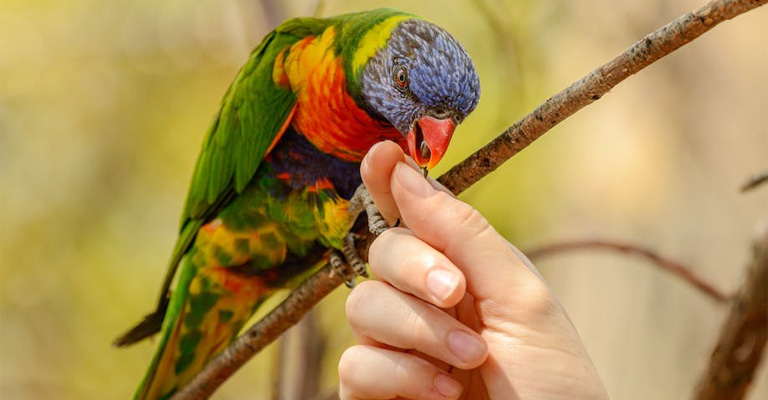
Here are a few examples of positive reinforcement techniques that can be used when your bird bites.
Reward Good Behavior
When your bird is not biting, reward them with a treat or a positive interaction such as a scratch or a game. This helps to reinforce good behavior and encourage your bird to repeat it.
Ignore Bad Behavior
If your bird bites, simply ignore the behavior and move away. This tells the bird that biting is not an acceptable behavior and will not be reinforced with attention or interaction.
Teach an Alternative Behavior
If your bird is biting because it wants attention or is bored, teach them an alternative behavior that is acceptable. For example, if your bird is biting your hand, teach them to step up onto a stick instead.
Give Verbal Cues
Use a verbal cue such as “good bird” or “good step up” when your bird is not biting and reward the behavior.
It’s important to remember that the key to success with positive reinforcement is consistency and patience. It may take time for your bird to learn what is acceptable behavior, but with consistent reinforcement, your bird will learn what is expected of them.
Training and Stick Training
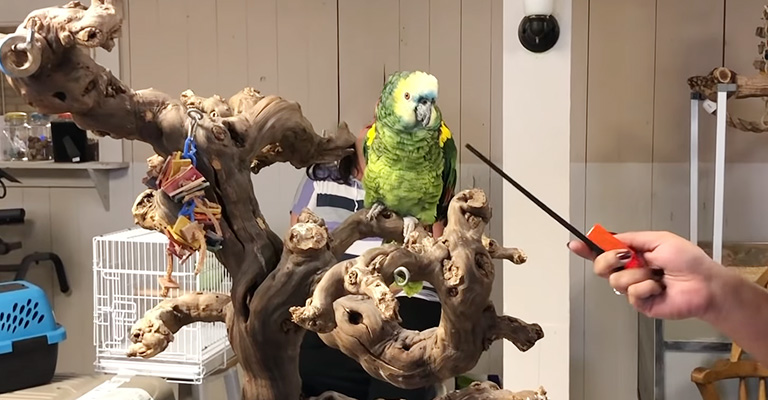
Training and stick training can be an effective way to prevent biting in birds. Stick training involves teaching your bird to step up onto a stick or your hand, which can help to redirect the bird’s energy and focus away from biting.
Providing plenty of toys, perches, and activities to keep your bird mentally and physically stimulated is also important in preventing biting.
A bored bird is more likely to bite, so providing a variety of stimulating activities can help to keep your bird occupied and reduce the likelihood of biting.
Here’s a step-by-step guide on how to teach your bird stick training:
- Start by introducing the stick to your bird. Hold it in front of the bird and let them investigate it. You can also use a treat to encourage the bird to interact with the stick.
- Once your bird is comfortable with the stick, hold it next to your hand and say the command “step up” or “up” as you gently press the stick against your bird’s chest.
- As soon as your bird steps onto the stick, give them a treat or a positive verbal cue such as “good bird” or “good step up”.
- Gradually increase the distance between your hand and the stick, so your bird has to step further and further onto the stick to reach you.
- As your bird becomes more comfortable with stepping up onto the stick, you can start to use it as a way to redirect your bird’s energy and focus away from biting. For example, if your bird is biting your hand, hold the stick out and say “Step up” instead.
It’s important to remember that stick training should be done gradually and at the bird’s own pace. Be patient, and always reward your bird for good behavior.
Also, stick training should be done consistently, in order to maintain the habit, and make sure your bird is mentally and physically stimulated.
Hormone Shots and Veterinary Care
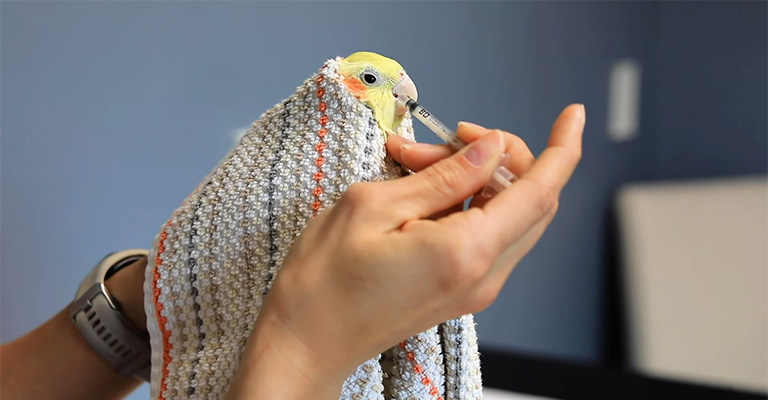
In some cases, biting behavior in birds may be caused by hormonal changes. Birds go through different hormonal cycles, such as breeding season, where they may exhibit more aggressive or territorial behavior, which may include biting.
Hormone shots, such as avian gonadotropin-releasing hormone (GnRH) or melatonin, can be used to help reduce biting behavior caused by hormonal changes.
These shots work by regulating the bird’s hormonal levels, reducing the symptoms of hormonal imbalances, and reducing aggressive or territorial behavior.
It’s important to consult with a veterinarian if you suspect your bird’s biting behavior is caused by hormonal changes.
A veterinarian can perform a physical examination and blood tests to determine if your bird’s biting behavior is caused by hormonal changes and recommend the appropriate treatment.
Punishment and Cage Association
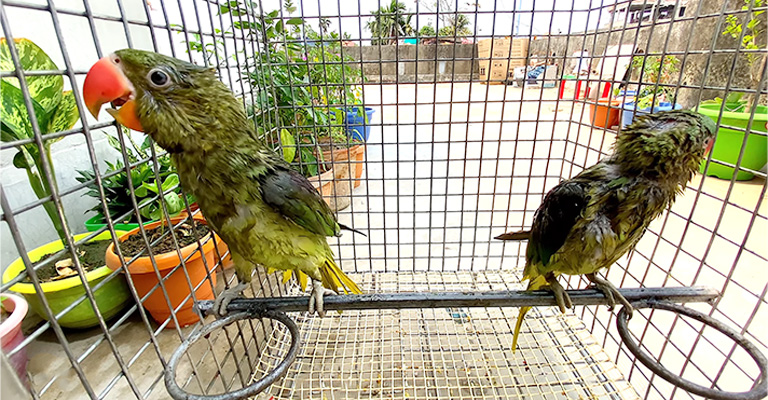
Using the cage as a punishment for biting is not an effective or recommended approach, as it will only make the bird associate the cage with negative experiences.
This can lead to a number of problems such as stress, anxiety, and an increased likelihood of biting.
Instead of using punishment, it’s important to focus on positive reinforcement and redirecting the bird’s energy and focus away from biting. Some alternatives to punishment that can be used to address biting behavior include:
Redirecting the Bird’s Energy
If your bird is biting because it is bored or over-stimulated, providing more toys, perches, and activities can help to redirect the bird’s energy and focus away from biting.
Teaching an Alternative Behavior
Teaching your bird an alternative behavior to biting, such as stepping up onto a stick or playing with a toy, can help to redirect the bird’s energy and focus away from biting.
Positive Reinforcement
Rewarding your bird for good behavior, such as not biting, can help to reinforce good behavior and encourage your bird to repeat it.
Time-out
Instead of putting the bird in its cage as punishment, you can give the bird a time-out by simply walking away from the situation or removing your hand.
This tells the bird that biting is not an acceptable behavior, without associating the cage with negative experiences.
Provide a Safe Place
Birds may also bite when they feel threatened, so providing a safe place such as a hiding spot, where the bird can retreat, can help to reduce biting behavior caused by fear.
FAQs
Yes, biting behavior in birds can be caused by a medical condition. For example, some birds may be more susceptible to biting or maybe biting due to pain or discomfort caused by an underlying medical condition. It’s important to consult with a veterinarian to rule out any medical causes of biting behavior and to provide appropriate treatment.
Yes, biting behavior can be passed on to other birds in the household if the behavior is not addressed. For example, if one bird is biting and the behavior is not corrected, other birds in the household may start to copy the behavior. It’s important to address biting behavior in all birds in the household in order to prevent it from spreading.
Using a spray bottle is not recommended as a method to discourage biting behavior in birds, as it can be ineffective and may cause the bird to become scared or stressed. Instead, focus on positive reinforcement and redirecting the bird’s energy and focus away from biting.
Biting behavior in birds can continue throughout their life, but it may decrease as the bird matures. However, it’s important to address biting behavior as soon as it occurs, regardless of the bird’s age, in order to prevent it from becoming.
Wrapping Up
Biting behavior in birds can be caused by a variety of factors, including territorial behavior, fear, over-stimulation, boredom, or hormonal changes.
Understanding the underlying cause of the biting behavior is crucial in addressing the issue effectively.
It’s important to not use the cage as a punishment for biting, as it will only make the bird associate the cage with negative experiences.
Make sure to remember that biting behavior can be a complex issue and it may take some time and patience to address it.
By focusing on positive reinforcement, consistency, and providing a safe and stimulating environment, you can help to reduce or eliminate biting behavior in their birds. Thank you for